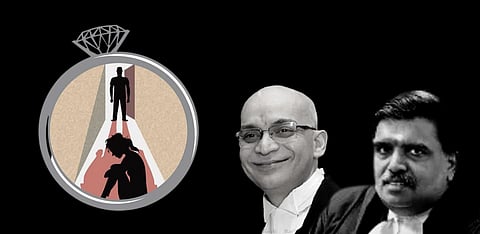

IN a much-awaited judgment, a division bench of the Delhi High Court on Wednesday gave a split verdict on the criminalisation of marital rape. Justice Rajiv Shakdher, who headed the bench, struck down Exception 2 to Section 375 (rape) of the Indian Penal Code [IPC] as being violative of Articles 14, 15, 19(1)(a) and 21 of the Constitution. He held that his declaration would operate from the date of his decision.
Justice C. Hari Shankar, however, chose to disagree with the opinion given by Justice Shakdher. He held that the second exception section 375 does not violate Article 14, and is based on an intelligent differentia having a rational nexus with the object both of the impugned Exception as well as Section 375 itself. He further held it does not violate Articles 19(1)(a) and 21. He held that none of the grounds on which a statute could be struck down existed in the present case. He added that the court could not substitute its subjective value judgment for that of a democratically elected government.
Both judges have agreed to grant a certificate of leave to appeal to the Supreme Court.
The bench had reserved its judgment on February 21 this year after a marathon hearing that lasted for days. Exception 2 to the Section 375 of the IPC states that any sexual intercourse or sexual acts by a man with his own wife, the wife not being under 15 years of age, is not rape (increased to 18 years by the Supreme Court in its judgment in Independent Thought versus Union of India & Anr. in 2017). In common parlance, this exception is referred to as 'marital rape'.
During the hearing, the Union Government refused to take any stand on the issue of marital rape, and urged the court to defer the hearing till the time it completes consultative process with the state governments.
Senior Advocates Rajshekhar Rao and Rebecca John, who were appointed as amici curiae, also argued against retaining the exception, while organisations namely 'Hridya' and 'Men Welfare Trust', led by advocates R.K. Kapoor and J. Sai Deepak respectively, opposed the petitions and argued that it was not for the Court to create a new offence by striking down the exception.
Advocates Karuna Nundy and Colin Gonsalves, appearing from the different petitioners' sides, argued against Exception 2. They argued that the Exception violates the bodily autonomy of married women and is manifestly arbitrary
Click here to view the Delhi High Court's judgment.